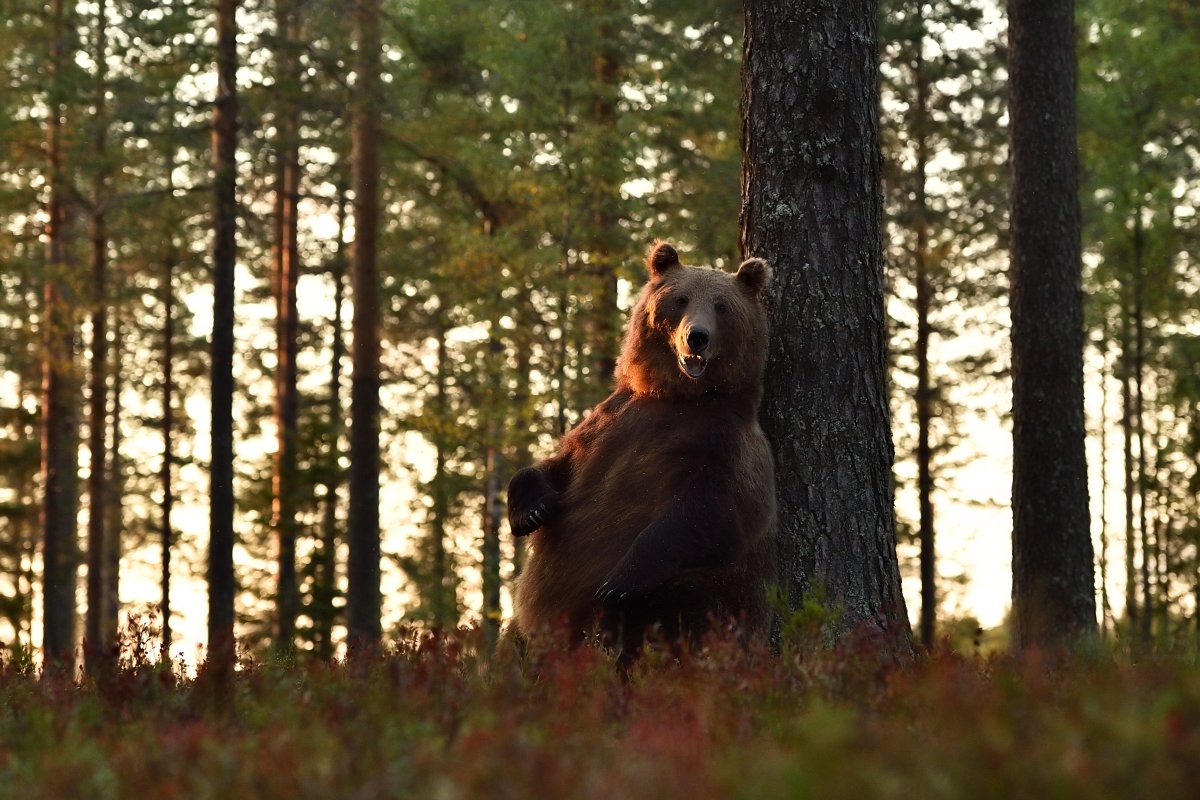As many of us know from Disney's The Jungle Book, bears love to rub their backs against trees. But there is so much more to this back rubbing than just scratching an incurable itch.
As well as spreading their scent to other bears, this behavior could also serve as a way of repelling disease-transmitting ticks, as is evidenced by a new study on brown bears published in the Journal of Zoology.
"Brown bear rubbing against trees is widely accepted as a form of chemical communication, crucial for social interactions between individuals of this non territorial species with such extended home range," Agnieszka Sergiel, a professor at the Polish Institute of Nature Conservation and one of the study's authors, told Newsweek.

"By rubbing to trees, individuals may self-advertise for mate attraction, communicate dominance status, assess competition or limit infanticides."
However, tree rubbing is also often accompanied by clawing and debarking of the tree's trunk, which releases a sticky resin that clings to the bear's fur. In the present study, this resin was shown to repel parasitic ticks.
"Ticks are an important vector for various diseases," Sergiel said. "Among wild species, large mammals are particularly susceptible to suffer from tick infestations.
"Ticks are a big family, and...are distributed in essentially all regions occupied by brown bears."
Evidence for tick-borne parasites, such as the bacterium that causes Lyme disease, has been reported in bears before, but Sergiel said that it was rare to find ticks on wild bears, in spite of their abundance. This could simply be because it's quite hard to find a tick on a bear, but tree-rubbing behavior may have also had a role in keeping their numbers down.

Rubbing behavior is not unique to bears and is seen across many different mammal species. The function of this rubbing may vary between different species. For example, foxes appear to use it as an anti-predation mechanism.
"Foxes [have been] shown to rub on pumas' scrapes throughout the year, but especially when the scrapes are fresh," Sergiel said. "The scent of pumas possibly deters [other] predators."
Other animals have also been observed selecting specific plant species for more topical uses. "Capuchin monkeys rub their fur with citrus fruits," Sergiel said. "Citrus peel exudates were notably shown to have a deterring effect on ticks."
The theory that bears use tree rubbing as a parasite repellent is not mutually exclusive with the suggestion that they do this as a form of communication. Bears that rub their fur more tend to achieve better reproductive success, and the antiparasitic mechanism of the resin would aid in this increased level of health, and therefore reproductive fitness.
Do you have an animal or nature story to share with Newsweek? Do you have a question about bears? Let us know via nature@newsweek.com.
References
Blaise A, et al., Anti-parasitic function of tree-rubbing behaviour in brown bears suggested by an in vitro test on a generalist ectoparasite, J. Zoo., 19 January 2023, https://doi.org/10.1111/jzo.13045
Paillard, L., Jones, K.L., Evans, A.L. et al. Serological signature of tick-borne pathogens in Scandinavian brown bears over two decades. Parasites Vectors, 28 July 2015, https://doi.org/10.1186/s13071-015-0967-2
Morehouse AT, Loosen AE, Graves TA, Boyce MS. The smell of success: Reproductive success related to rub behavior in brown bears. PLoS One, March 2 2021, doi: 10.1371/journal.pone.0247964
Uncommon Knowledge
Newsweek is committed to challenging conventional wisdom and finding connections in the search for common ground.
Newsweek is committed to challenging conventional wisdom and finding connections in the search for common ground.
About the writer
Pandora Dewan is a Senior Science Reporter at Newsweek based in London, UK. Her focus is reporting on science, health ... Read more





